Ellie the elephant: the mascot who became a movement
Ellie I did not know your game, and I am sorry.
Thank you for being here. You are receiving this email because you subscribed to Idée Fixe, the newsletter for curious minds. I’m Toni Cowan-Brown, a tech and F1 commentator. I’m a former tech executive who has spent the past five years on the floor of way too many F1, FE, and WEC team garages, learning about the business, politics, and technology of motorsports.
⏳ Reading time: 5min
I was in NYC last week for a handful of events, mostly the US Open (more on that in the next newsletter article), but I also attended a Liberty basketball game, visited the Bloomberg offices and attended a Momentum dinner hosted by KAW Management’s The Kitchen and JPMorgan Private Bank. New York truly never disappoints. A huge thank you to everyone for having me.
My first-ever New York Liberty game stuck with me for many reasons, but none more so than the electrifying performance of Big Ellie, New York Liberty’s mascot and the young crowd that she interacted with. Seriously, what is the average age at a WNBA game these days? Although it feels wrong to call her a mascot, so today we are going to talk about how Ellie is not just a mascot; she’s a phenomenon.
More than just a mascot, a phenomenon
In sports, mascots are usually treated as comic relief, cartoonish diversions who fill TV timeouts with slapstick antics and free T-shirt tosses. But every so often, one transcends the sidelines. For the New York Liberty team, that figure is Ellie the Elephant: a towering, twerking, handbag-carrying, rhinestone-studded reminder that sports culture is changing before our eyes.
Since debuting in 2021, she has become one of the most recognisable symbols of the WNBA - recognised not only in arenas but on TikTok, and even mentioned in The New York Times’ annual list of the most stylish people. That’s a long way from the traditional script of a sports mascot, and it says something profound about where women’s sports - and sports culture more broadly - are heading.
Breathing new air into New York Liberty
When the New York Liberty team moved from Madison Square Garden to Brooklyn’s Barclays Center, the team needed a fresh identity. Their previous mascot, Maddie the dog, was beloved but tied to an era when the Liberty were tenants in MSG, often overshadowed by the Knicks. Enter Ellie.
The symbolism was deliberate: elephants stand for strength, wisdom, and community. Brooklyn lore also shaped her story - P.T. Barnum famously marched elephants across the Brooklyn Bridge in 1884 to prove its sturdiness. By rooting Ellie in both history and mythology, the Liberty created a character who felt bigger than a gimmick.
But the true alchemy lies in how Ellie has been performed. Styled like a pop star, with outfits referencing Beyoncé or Missy Elliott, she isn’t just entertaining; she’s aspirational. I left wondering if Ellie has an agent and brand deals I should be aware of. In a league that has fought for visibility, Ellie amplified the Liberty’s cultural footprint, drawing in fans who might not have tuned in for basketball alone but couldn’t resist a dancing elephant with impeccable sneakers.
More than entertainment
Ellie’s routines - the Ellie Stomp, her TikTok dances, her half-time tributes to hip-hop royalty, I don’t think I actually saw her stand still once for the duration of the evening, do more than fill breaks in play. They embody a shift in how we think about sports spectacle. The modern game isn’t confined to the scoreboard; it’s about the entire experience. Just as Formula 1 has embraced fashion, cinema and Netflix storylines, the WNBA has leaned into Ellie’s blend of dance, music, and style to reach new audiences.
In this sense, Ellie is a case study in what cultural theorists call “convergence culture.” Sports no longer sit in a silo; they merge with entertainment, fashion, politics, culture and identity. You would be foolish to try and separate these components. A mascot who once might have been confined to children’s birthday parties now sets trends and headlines in Vogue.
A mirror for today’s sports culture
Ellie also represents a profound cultural truth: fandom is diverse, intersectional, and identity-driven. She has been embraced as a queer icon, celebrated for her flamboyance and inclusivity. That is not incidental; it reflects the Liberty’s audience in Brooklyn, a city where communities expect representation, not tokenism.
Sports mascots were once designed to be safe and universal, stripped of subtext. Ellie, by contrast, is full of meaning. She is loud, stylish, unapologetic - a reflection of how today’s fans don’t just want to watch sport; they want to see themselves in it and co-create.
From an academic lens, this is the difference between mascots as symbols and mascots as agents of culture. Symbols are static; they represent a team. Agents of culture are dynamic; they actively shape how the team is perceived and how fans engage. Ellie is very much the latter.
The business of Ellie
Because she means business. None of this is just cultural window dressing. Ellie has a tangible commercial impact. She sells merchandise. She drives digital engagement. She positions the Liberty team as more than a basketball team, but as a lifestyle brand with Brooklyn swagger. I overheard people in the crowd asking, “So when is Ellie’s dance routine coming up?” - sure, they were there for the game, but also very much to see Ellie.
At a time when women’s sports are commanding unprecedented sponsorship dollars, Ellie’s visibility makes her part of the Liberty’s value proposition. A corporate partner doesn’t just get courtside signage; they get association with the coolest elephant in sports, whose videos regularly outperform traditional ad campaigns and whose audience is possibly the sport’s next big fanbase.
In the language of marketing, Ellie is what you might call a “transmedia property.” She exists across platforms - the arena, TikTok, page of traditional media and even a parade float - carrying the Liberty’s brand into spaces the scoreboard cannot reach.
Why she matters
For me, what makes Ellie so compelling is not only her cultural fluency but her joy. Watching her perform feels like watching the WNBA itself: unapologetic, stylish, disruptive, and celebratory. She is a reminder that sports can be fun and radical at the same time. And perhaps most importantly, Ellie shows that representation doesn’t have to be subtle. Too often, women’s sports are packaged with an apologetic tone, as if worried about being “too much.” Ellie is the opposite of that. She’s extra, in the best way - loud, proud, and impossible to ignore.
When we talk about the future of sports fandom, Ellie is a blueprint. She demonstrates that growth comes not from mimicking the old models of men’s leagues but by embracing difference: leaning into culture, identity, and entertainment. Ellie is not an accessory to the New York Liberty. She is part of the Liberty’s DNA, an embodiment of the idea that women’s sports don’t need to justify themselves - they need to express themselves. That’s why she is more than a mascot. She’s a movement.

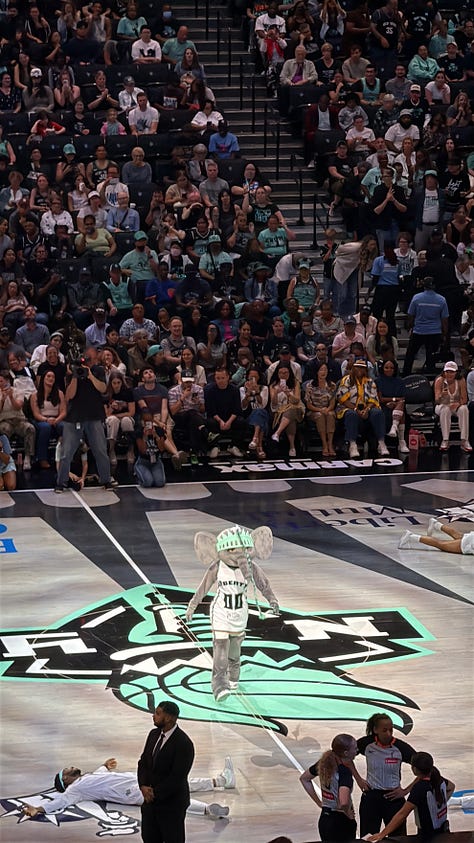

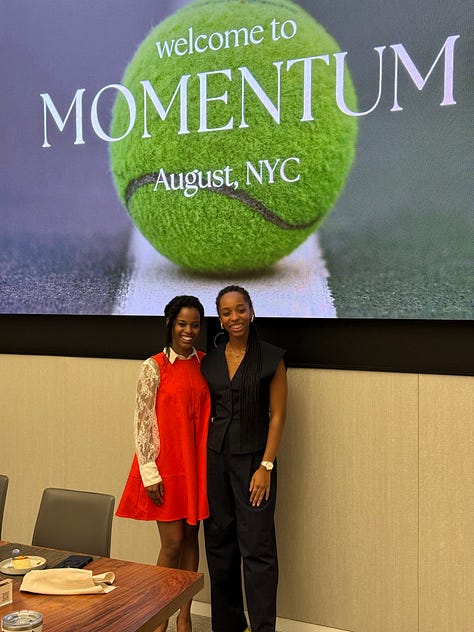
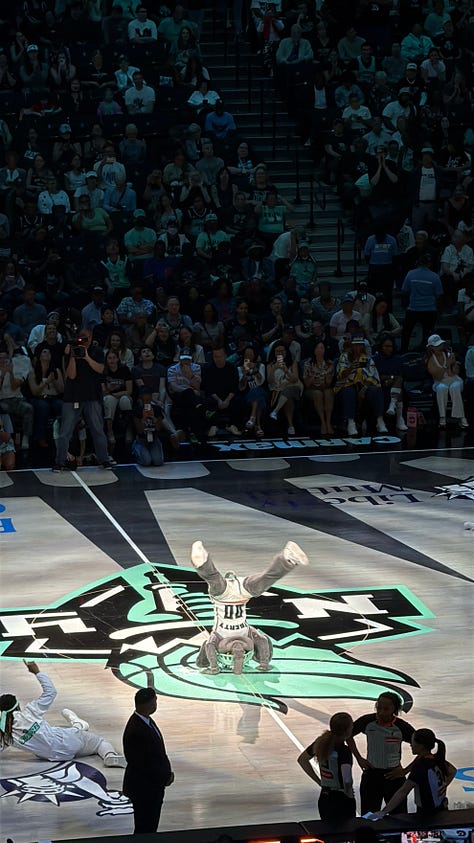


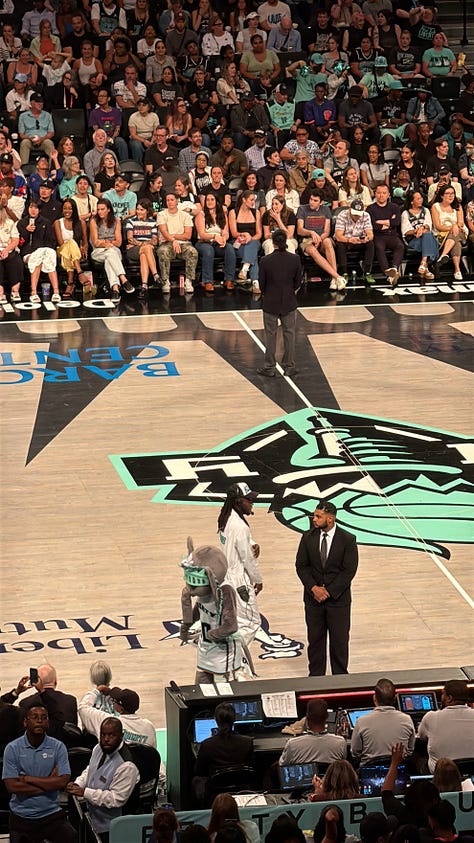
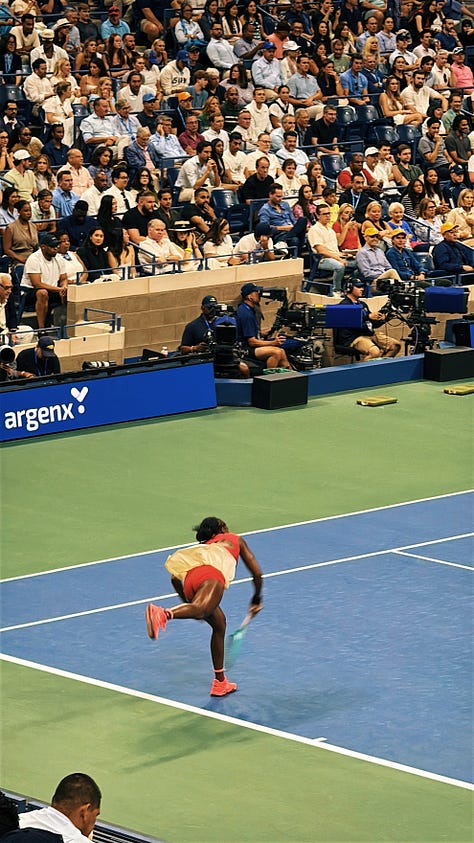
🔗 An Influencer Inside the Rolex Box | The Puck
At the end of every summer, the luxury gravy train arrives in Flushing, where brands use their suites, and two weeks of Grand Slam tennis, to market their wares via an army of influencers. But what’s all that brand marketing doing to the U.S. Open itself? Read here (paywalled)
🔗 WNBA breaks single-season attendance record that had stood since 2002 | AP
With 2 1/2 weeks left in the WNBA’s regular season, the league has already broken its single-season attendance record. League officials announced Thursday that the league’s 13 teams have drawn a total of 2,501,609 fans over 226 games this season, surpassing the previous mark that was set in 2002 when the league had 16 teams. It also took the WNBA 256 games to reach the milestone in 2002. Read here.





